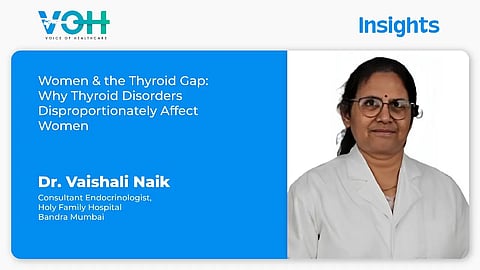

Thyroid disorders are one of the most common endocrine issues affecting women, yet they remain significantly underdiagnosed and under-discussed — particularly in the context of reproductive health. Conditions like hypothyroidism and hyperthyroidism are up to 8 to 10 times more common in women than in men, with key life stages such as puberty, pregnancy, postpartum, and menopause acting as hormonal triggers.
Many symptoms — such as fatigue, weight fluctuations, mood changes, irregular periods, or difficulty conceiving — are misattributed to stress, PCOS, or general lifestyle factors or even early menopause — especially in younger women navigating work-life pressures or postpartum recovery.
What many don’t realize is that thyroid hormones are closely tied to the reproductive system. They influence everything from menstrual regularity and ovulation to fertility and pregnancy outcomes. Hypothyroidism (an underactive thyroid) can lead to heavy or irregular periods, difficulty conceiving, and even increase the risk of miscarriages or premature births. Hyperthyroidism (an overactive thyroid), on the other hand, may cause lighter or missed periods and exacerbate anxiety or insomnia.
There’s a growing body of evidence suggesting that undiagnosed thyroid issues can significantly impact mental health — contributing to chronic fatigue, brain fog, irritability, and even depression. In India, where conversations around mental wellness are just beginning to gain ground, the thyroid’s role in mood and emotional regulation is still largely misunderstood.
Add to this the influence of lifestyle misinformation — from fad diets to supplement culture — and many women unknowingly worsen their thyroid function in pursuit of “wellness.” I frequently see patients who have self-medicated with iodine drops, selenium supplements, or extreme diet plans after encountering poorly researched advice online.
At Holy Family Hospital, we are increasingly advocating for routine thyroid screening as part of women’s preventive healthcare, especially during key hormonal milestones — puberty, conception planning, pregnancy, and postnatal recovery. A simple blood test (TSH, T3, T4) can identify thyroid imbalances early and help prevent a cascade of complications.
Despite this, awareness remains low. Many women visit an endocrinologist only after years of unexplained symptoms or failed fertility treatments. We need to shift this narrative.
The future of women’s health must include a more integrated approach, where gynecologists, endocrinologists, and mental health professionals collaborate to diagnose and manage thyroid dysfunctions holistically. Early intervention not only improves quality of life but also safeguards long-term heart, bone, and brain health.
As healthcare providers, we must ensure that thyroid health isn't treated as an isolated issue, but as an integral part of a woman’s overall well-being. And as individuals, we need to listen to our bodies, push for answers, and ask for thyroid testing when symptoms don’t add up.